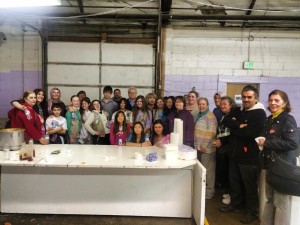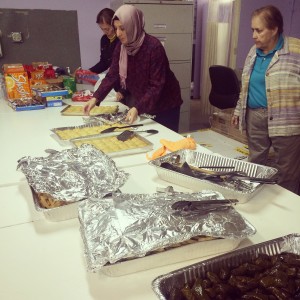
MIDVALE — Dozens of volunteers gathered at The Road Home to serve dinner to homeless families in need as part of the Talk In Action program.
The dinner was served by volunteers through the Pacifica Institute’s branch, Talk In Action. Pacifica is a nonprofit organization of Turkish-Americans that organizes projects covering social welfare, education, poverty and conflict resolution issues. Talk In Action is a branch of Pacifica that creates events and gathers volunteers from different religions to serve the local community together.
“The main idea behind Talk In Action is we all come from different traditions,” said Zeynep Kariparduc, a Pacifica Institute member from Turkey. “We have Jewish, Christian and Muslim here. We are doing very good stuff, but we have a more meaningful idea behind this. We want to tell the people or teach the people that we are different, we are all different, we have many differences, but we love each other, and we want to do something good for humanity.”
Many members of the Pacifica Institute and Interfaith Roundtable, as well as a troop of Girl Scouts, helped serve the dinner to the homeless. They served an authentic Turkish meal of grape leaves and lentil soup, with shakarpara for dessert.
Pam Worthington, a BYU alumna from Murray, knew volunteering at this event would be a good experience for her and her grandchildren.
“I knew it was a fulfilling experience, and I wanted my grandchildren to have the experience as well — feeling like you’re at service to someone,” Worthington said.
Everyone who came and volunteered, despite their religious affiliation, had the common goal of serving others. Many people talk about the idea of giving service, but actually going out into the community and having that firsthand experience is the essence of Talk In Action — literally putting what you say into action.

“I invited members of our church to come, so it’s giving the kids the experience of serving,” said Wendy Stovall, a board member of the Interfaith Roundtable, from Taylorsville. “You talk about volunteering, but a lot of times that’s just within the school or something, and they don’t often have the opportunity to see people in hardship. So I think it gives them more empathy serving people like that. You always hear people talk about The Road Home, but to actually see it and know what they’re going through and imagine being in this situation — it’s tough.”
“We can’t save the world, but we can do something for the people who are around us,” said Kariparduc. “So if everybody does the same around the world, nobody will be in need. We don’t need to do big stuff, just small ones, and that will maybe be enough.”




